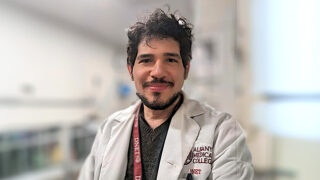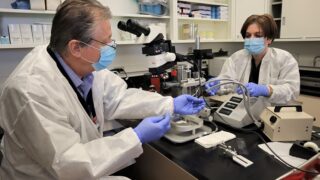Viktor B. Fenik, PhD
Associate Professor
Areas of Study
Sleep, Respiration, Sleep disorders
Bio
Dr. Fenik is co-leading the Sleep and Sleep Disorders Laboratory with Dr. Rukhadze. Dr. Fenik’s research has been being funded by NIH since 2009. Dr. Fenik has a background in biophysics and physiology with expertise in in vitro/in vivo electrophysiology, and sleep and respiratory neurobiology. The current focus of the laboratory is the study of pathophysiology of obstructive sleep apnea, a growing health problem that results in adverse sequelae. Dr. Fenik pioneered the noradrenergic mechanism that is responsible for sleep-related depression of upper airway muscles, which laid the groundwork for the first clinical trials using the combination of atomoxetine, an adrenergic transporter inhibitor, and oxybutynin, a muscarinic antagonist to treat obstructive sleep apnea (OSA). Dr. Fenik theorized that noradrenergic drive to the hypoglossal nucleus is not direct but mediated by interneurons located outside the hypoglossal nucleus. Recent study performed in our laboratory suggested that these interneurons are located within the “pre-hypoglossal region” (PHR) and that they control the state-dependent activity of hypoglossal motoneurons, and thereby the upper airway muscles, using a1-noradrenergic and NMDA glutamatergic receptors.Dr. Fenik’s current research is focused on answering the following questions: 1) Do the PHR interneurons mediate NA drive to the hypoglossal nucleus? 2) Do the PHR interneurons also transmit cholinergic drive to the hypoglossal nucleus? 3) What is the neurochemical phenotype of PHR interneurons? 4) Which neurons project to PHR interneurons and modulate their activity? 5) Are projections of PHR interneurons to the hypoglossal nucleus direct or indirect?
Together, our research aims to uncover neurochemical mechanisms and neuronal circuitry that controls the state-dependent activity of hypoglossal motoneurons to uncover novel therapeutic targets, which would improve the pharmacological treatment of OSA.
Education
- University of Pennsylvania1998Postdoctoral Training
- Ukrainian National Academy of Sciences 1991PhysiologyPhD
Publications
View Victor B. Fenik’s articles on the National Institute of Health's PubMed website.

